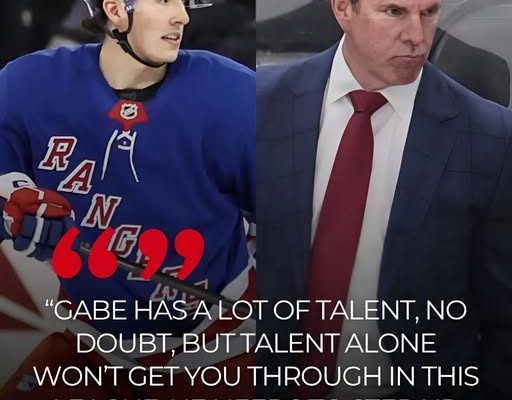New York Rangers fans were caught off guard when newly appointed head coach Mike Sullivan didn’t mince words about one of the team’s most promising young talents, Gabe Perreault. In a league where coaches often go out of their way to protect developing players from public criticism, Sullivan’s decision to directly challenge Perreault sent a message loud and clear—not only to the 19-year-old forward but to the entire Rangers roster. The quote that sparked headlines—“He needs to step up”—wasn’t said with malice, but with the firm tone of a coach who knows exactly what it takes to win at the highest level and isn’t willing to lower expectations, even for a rookie brimming with potential. For Perreault, this is the kind of moment that can either ignite a breakout or set back a career, depending on how he responds.
Mike Sullivan isn’t just any coach parachuting into the New York market; he arrives with a resume that demands respect. Having led the Pittsburgh Penguins to two Stanley Cup championships, he’s a veteran leader known for his structured systems, accountability, and refusal to accept mediocrity. Sullivan’s coaching philosophy is built on the belief that young players must buy into a team’s culture immediately, regardless of age or draft status. For him, being a first-round pick doesn’t guarantee ice time—it has to be earned shift by shift. That is the context behind his pointed comments toward Perreault. To Sullivan, challenging the young forward now is a way to instill urgency and accelerate his growth before bad habits have time to solidify.
Gabe Perreault entered the Rangers’ organization with high expectations after being selected in the first round of the 2023 NHL Draft. Known for his elite vision, silky hands, and offensive creativity, he’s long been touted as one of the most exciting prospects in New York’s pipeline. Coming from a strong hockey pedigree—his father Yanic played over 800 games in the NHL, and his brother Jacob is a Ducks prospect—Perreault seemed destined for the big stage. But as is often the case, transitioning from junior and collegiate hockey to the NHL is a steep climb. The physicality is higher, the defensive systems are more complex, and the margin for error is razor-thin. While flashes of his potential have been visible in preseason play and early training camp sessions, Sullivan’s remarks suggest that he believes Perreault has another gear he has yet to find.
The bluntness of Sullivan’s words may have shocked fans, but veterans in the locker room likely recognized it as a calculated move. Coaches like Sullivan understand the psychological dynamics at play—sometimes a young player needs an extra push, and sometimes that push has to be public to make a point. Calling out a player in the media can serve multiple purposes: it lights a fire under the individual, signals to the rest of the team that no one is above accountability, and shifts the pressure from being quietly internal to a matter of public perception. In the New York market, where the media spotlight is intense, this can be a defining test for a rookie’s mental toughness.
Sullivan’s timing is particularly notable. The Rangers are entering a season with legitimate Stanley Cup aspirations, and there’s little room for developmental growing pains if the team wants to contend. While the Rangers’ top-six forward group is anchored by stars like Artemi Panarin, Mika Zibanejad, and Chris Kreider, depth contributions from younger players could be the difference in playoff positioning. Perreault’s skillset theoretically makes him a perfect fit for a third-line scoring role, but Sullivan’s comments imply that he hasn’t yet earned that trust. Whether it’s in practice habits, defensive responsibility, or physical engagement along the boards, the message is that Perreault needs to round out his game quickly.
For Perreault, the next few weeks will be crucial. NHL locker rooms are filled with stories of young players who responded to criticism by elevating their play and proving their doubters wrong. There are just as many tales of players who let the weight of expectations drag them down. His challenge now is to embrace the feedback without letting it shake his confidence. Sullivan is not the type of coach to give away praise cheaply, so if Perreault does put in the work and adjusts his game, the turnaround in tone will be swift and public. Players who’ve succeeded under Sullivan in the past often speak about how the initial hard edges of his coaching style ultimately sharpened their performance.
The reaction from Rangers fans has been mixed. Some see Sullivan’s candor as refreshing—a sign that the new coach won’t coddle anyone, even top prospects. Others worry that calling out a young player so early could stunt his confidence, especially in the high-pressure New York environment. Yet, for all the noise, NHL history is littered with examples of rookies who benefited from tough love. Sidney Crosby himself credited Sullivan’s demanding style for helping keep the Penguins at a championship level. The difference now is that Perreault is not an established superstar; he’s a young player fighting for ice time. That makes his response even more pivotal.
Inside the Rangers’ locker room, Sullivan’s comments will almost certainly be interpreted as part of a larger message. This is a team that has shown flashes of greatness in recent years but has fallen short of ultimate success. The Eastern Conference is loaded with talent, from the powerhouse Florida Panthers to the always-dangerous Tampa Bay Lightning and Boston Bruins. For the Rangers to climb to the top, their young players must bridge the gap between potential and production. If Perreault rises to the occasion, his skill could be a major asset. If he doesn’t, there’s no shortage of hungry prospects in the organization eager to seize his spot.
From a tactical standpoint, the areas where Perreault likely needs to improve are clear. His offensive creativity is undeniable, but Sullivan’s system demands relentless backchecking, disciplined positioning in the defensive zone, and a willingness to battle in the dirty areas of the ice. Against NHL defenders, scoring chances are earned as much through physical engagement and defensive reliability as they are through highlight-reel plays. For a coach like Sullivan, a young forward who neglects the defensive side of the puck risks losing trust quickly, no matter how skilled he is offensively.
The relationship between coach and player will be fascinating to watch as the season unfolds. Public callouts can either fracture trust or, paradoxically, strengthen it—if the player buys into the idea that the coach’s high standards are meant to help, not hinder. Perreault has the benefit of coming from a hockey family, which likely means he’s been exposed to hard coaching before. But the NHL stage magnifies everything. The challenge is to internalize the message without letting the outside noise become a distraction.
In the broader context of the Rangers’ season, this incident might be remembered as a small but defining moment. Sullivan’s arrival represents a cultural shift toward uncompromising standards and accountability. Perreault’s development is just one subplot in a season that will be defined by whether the team can translate talent into consistent, playoff-ready performances. For the Rangers, the hope is that this public nudge will help unlock another level in a young player who has the tools to be an impact scorer for years to come.
At the end of the day, Mike Sullivan’s decision to call out Gabe Perreault says less about any personal frustration with the player and more about the expectations he’s setting for the entire team. This is a coach who’s been to the mountaintop and knows the grueling climb it takes to get there. For Sullivan, every player—rookie or veteran—must carry their share of the load. For Perreault, the message is simple: the NHL is not a place where potential alone earns you a permanent spot. It’s about production, consistency, and the willingness to adapt. The sooner he embraces that reality, the sooner he can take the next step in his career and prove that Sullivan’s challenge was the spark that lit his rise to prominence.
If Perreault does rise to the occasion, this early-season moment of public accountability could be remembered not as a slight, but as the turning point that propelled him from promising prospect to key contributor on a contending team. And if that happens, Sullivan’s tough-love approach will be vindicated in the most satisfying way possible: by watching a young player he challenged become exactly the kind of difference-maker the Rangers will need if they hope to hoist the Stanley Cup in the near future.



